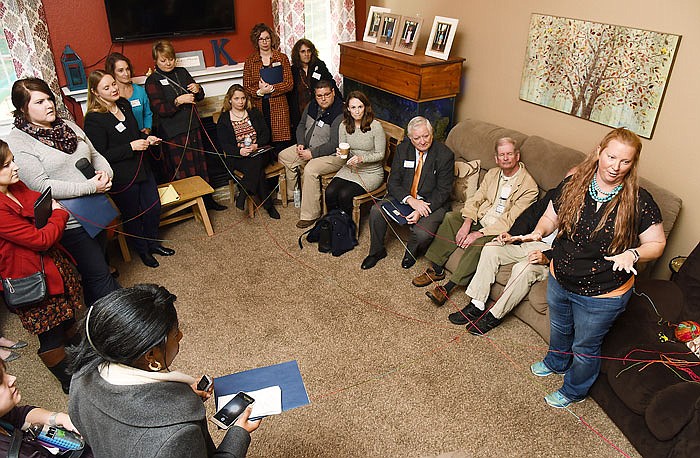For many of the 1,400 children in foster care across Mid-Missouri, feeling safe means having a permanent home.
Local child advocates got a look Monday at how safety nets are important during a child's journey in foster care.
"The sobering statistic in my business is that once a child is removed from their parents, one out of two children will not go home," Cole County Circuit Judge Jon Beetem said. "Juvenile court is like a fireman's blanket. Everyone has a corner and the baby jumps out the window, but if any one person lets go, the ball falls out. Everybody has to do their job to make this work."
During the past nine years, the Central Missouri Foster Care and Adoption Association has taken community members on a tour of what children endure when they enter the foster care system, highlighting how stressful it can be for a child to shift from their own home to an unfamiliar family on any given day.
Throughout the day, representatives from the Missouri Department of Social Services Children's Division, Cole County Sheriff's's Department, Jefferson City High School, Michael Prenger Family Center, Capital City Court Appointed Special Advocates (CASA), St. Mary's Hospital, Pathways and others offered how they work to get foster youth the necessary resources, with the end goal of reunifying children with families and/or next of kin or finding permanent housing placements for them.
Many advocates named funding, communication among agencies and a lack mental health providers specialized for children as key challenges they encounter.
To capture how state agencies work with families to bring foster children comfort and a sense of stability, Erin Kremer spoke about her experiences as a foster parent for nine years.
She has fostered children for various periods of time over the years - anywhere from one day to four hours to a year and a half.
"One of the things I've learned is that you don't realize how this stuff is in your backyard. Kids are hungry and don't have good homes - it's real and they want to be loved and to have structure," Kremer said.
She has since adopted two children and currently is fostering two siblings.
Kremer initiated a group activity to illustrate the emotional stress that can come with being a child in the foster system.
She connected a group of 10-15 people with a ball of string, representing the relationships children have with family members and relatives prior to entering the foster system. Once they enter the system, those ties usually are cut or strained by limited visits.
"I think sometimes we just think all we have to do is give a child in foster care love and clean clothes, but they don't always remember that stuff," Kremer said. "They know the people who have been in their lives and that now they are being separated from everything they know."
Ultimately, one of four things can happen for children in foster care, CMFCAA President/CEO DeAnna Alonso said: they can be reunited with their families, remain in foster care, age out of the system without being placed in a permanent home or be adopted.
Among the group was Missouri first lady Sheena Greitens.
"The child welfare system is complicated, and it's really important to be able to see it through the eyes of the kids who are going through this process," Greitens said. "(Gov. Eric Greitens) and I want this to be the best state in the country for kids in foster care going throughout the adoption process. A really important part of of that is listening to kids and knowing how this feels and their experiences."
State Rep. Sara Walsh, R-Ashland, took notes and asked questions about how the Legislature could help address some of those challenges.
"As a newly elected representative, I'm going to be taking votes on legislation next year. I think it's very important to get out into the community and be as educated as possible on the issues that matter to Missourians," she said.

